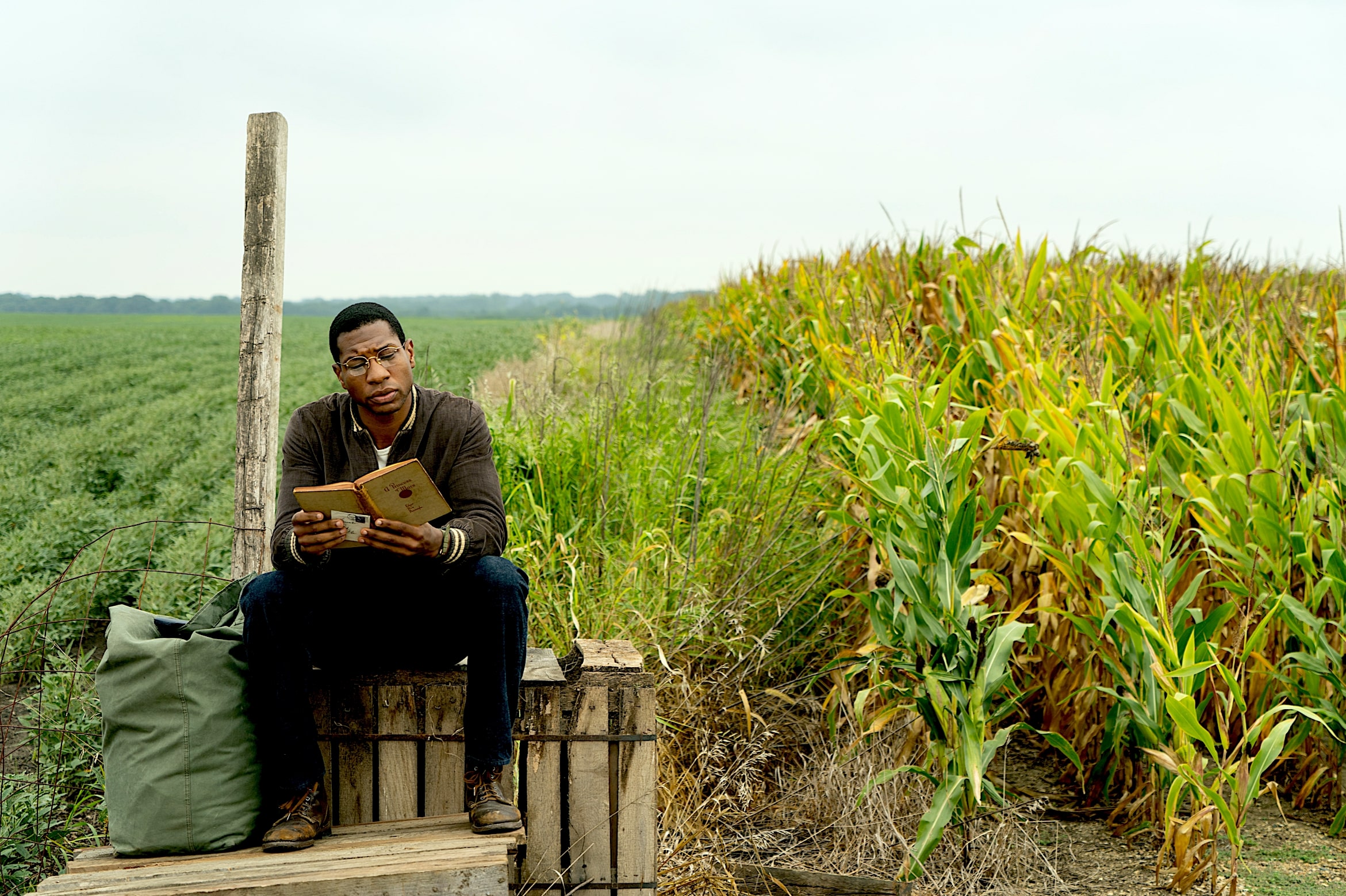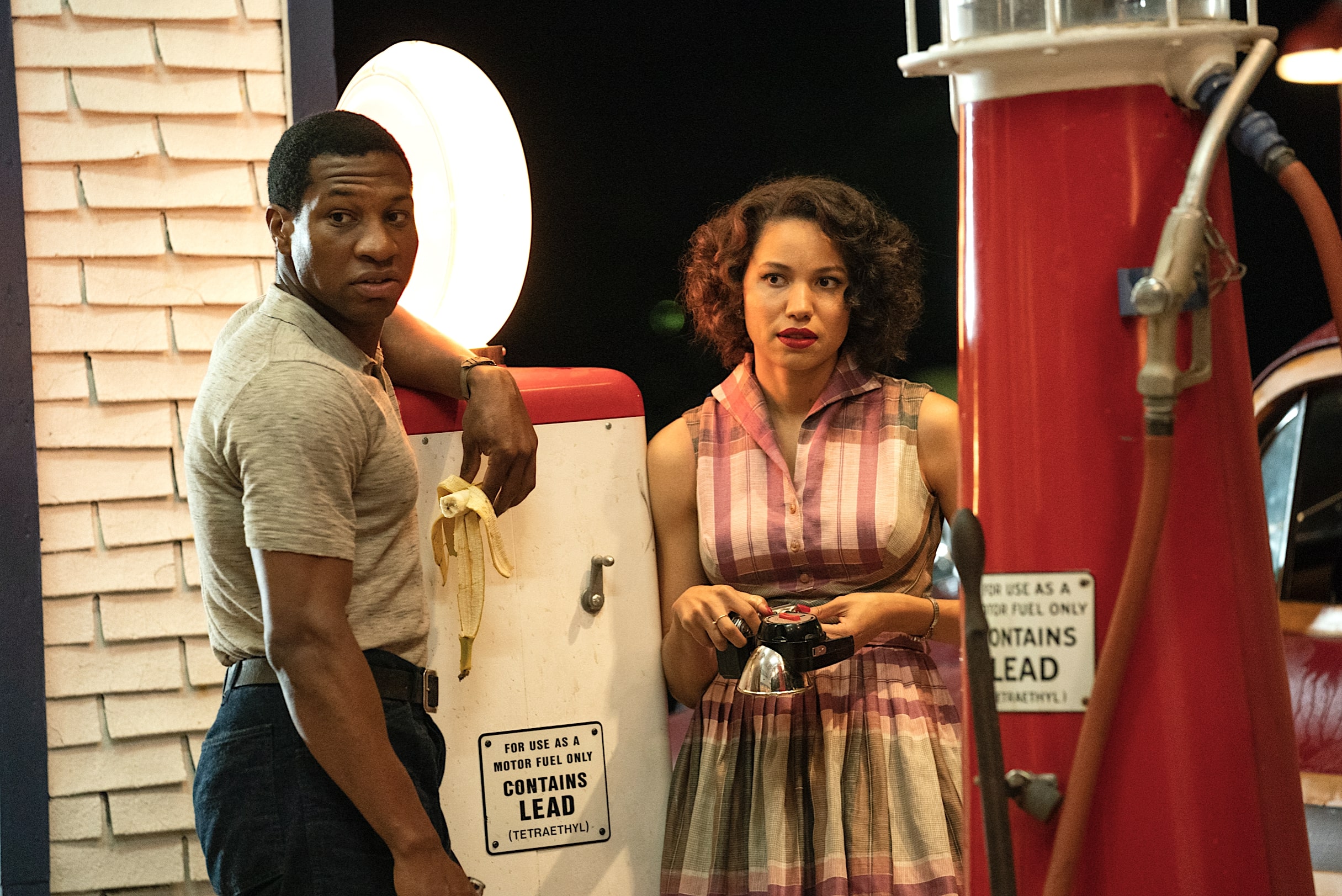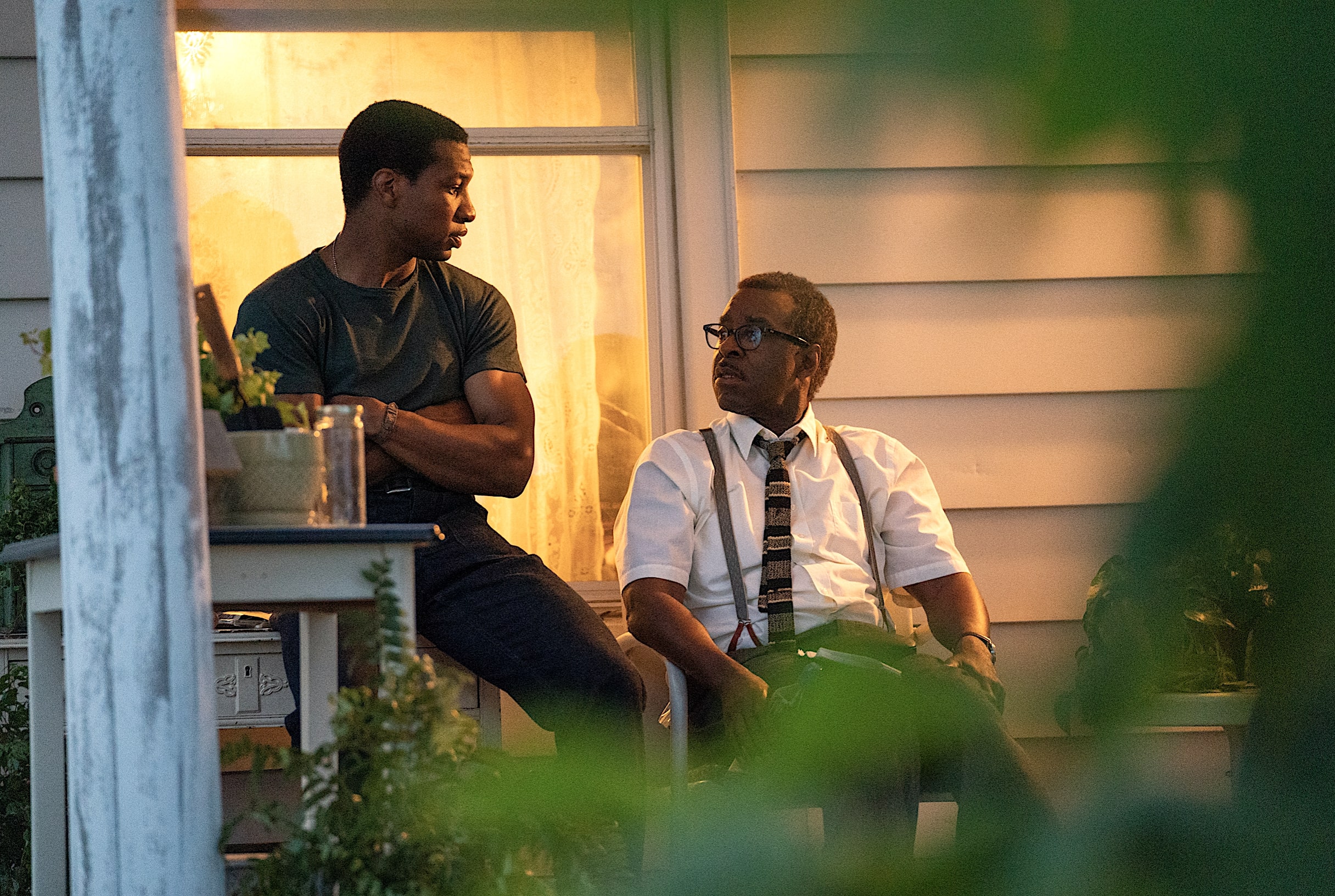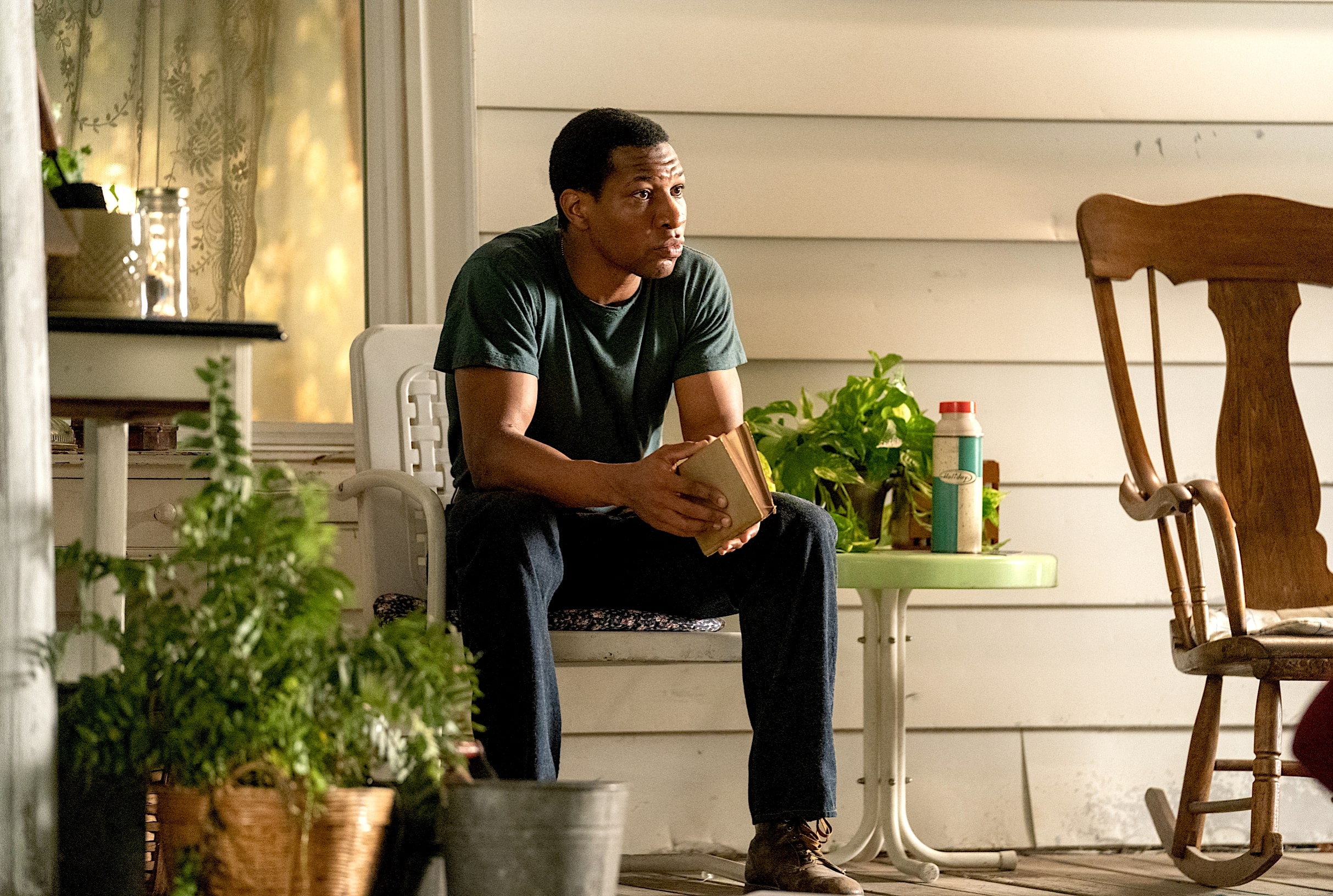Jonathan Majors of ‘Lovecraft Country’: Keeping one’s head on a swivel is integral to the survival of African-American race

Jonathan Majors
The fascinating tale driving the story of HBO’s visually and thematically exquisite “Lovecraft Country” is pretty straightforward. Set in the racially segregated ’50s, the 10-part series, which began airing on HBO Go and HBO at 9 a.m. and 10 p.m. last Monday, is about a young black man, Atticus “Tic” Freeman (Jonathan Majors), who embarks on a truth-seeking road trip to look for his missing father, the secretive and stubborn Montrose (Michael K. Williams).
Keeping Atticus company in this adventure are his Uncle George (Courtney B. Vance) and eventual love interest, Letitia “Leti” Lewis (Jurnee Smollett).
Be forewarned: The show, a hybrid between a racially charged drama and a monster flick and produced by the formidable tandem of Jordan Peele (“Get Out,” “Us”) and JJ Abrams (“Lost,” “Alias,” “Star Wars: The Rise of Skywalker”), quickly sets itself apart as it seamlessly hopscotches between genres, defying a string of storytelling conventions along the way.
Framed by gorgeously staged sequences that scorch and smolder, the “Lovecraftian” conceit plays out as a cracklingly paced and deeply nuanced meditation on racism and man’s perpetual search for identity.
To say that “Lovecraft Country” will take you on a thrilling, sometimes discombobulating, roller-coaster ride would neither be hogwash nor hyperbole. For instance, in one scene, you’ll see Leti, Tic and Uncle George being chased away by bigots, for the “impertinence” of ordering food in a white-only diner. In another, they’re terrorized and trapped by a racist sheriff while a nefarious creature lurks in their midst unnoticed! You can’t be any more eventful than that.
So, you can imagine how thrilled we were when we spoke to Jonathan, the show’s Yale-trained lead actor, last seen on the big screen in Spike Lee’s delectable war drama “Da 5 Bloods,” in a video interview last week. He was kind and courteous without being obsequious.
At one point, out of excitement, the 30-year-old thespian excused himself to go to his room to pick up four masks that he commissioned in Bali to help him shape his characterization. Which other actor would be as accommodating?

With Jurnee Smollett in HBO’s “Lovecraft Country”
And, boy, how he articulated his thoughts about oppression and legacy, George Floyd’s “assassination” (as he calls it), the monsters that terrified him as a child, and the #BlackLivesMatter (BLM) movement.
“I had an acting teacher who once said to me, ‘I am training you for theater, not for life,’” Jonathan recalled when we asked about his remarkable projects. “He told me that there always has to be a sense of occasion when you do something, so I think of that when I look at scripts. I try to find what’s special about them.”
The actor is particularly pleased that, for a change, brave Black characters are at front and center of a science-fiction production. “In sci-fi, the Black guys always die,” he noted. “So, it’s extremely important to bring African-American characters to the genre and not have them killed.
“In science-fiction or horror, it’s not necessarily the muscle that wins. It’s usually a matter of thinking, of how smart you can be in order to survive. Expanding the scope and inclusivity to African-Americans is a huge step, and I hope this sends the message that Black people can do other things than rapping and basketball.”
Our Q&A with Jonathan:
What kind of message do you want to come through from “Lovecraft Country”?
I want the drama that drew me to this piece to resonate with viewers. I want people to see that [more than its theme or genre,] this story is about a family—about a young man, his father, his aunt, his cousin and the woman he falls in love with, as well as the adventures they embark on to claim their legacy. And the beautiful thing about this drama is the fact that our protagonists are African-Americans—and that’s [the kind of representation] we don’t always get to see onscreen.
We now have the Black Lives Matter movement. I find that curious because this country is not quite the melting pot it’s purported to be. Black lives are unknown in some places. In others, they don’t even know Black people—they only “know” the idea of having Black people around.
In my opinion, we haven’t been portrayed enough in drama, in cinema or in literature to get the full picture of what Black life really is. So, when you watch the show, there are many distinct characters sharing the DNA of how it is to be African-American.

With Courtney B. Vance —PHOTOS COURTESY OF HBO
I heard that you were not a fan of “weird fiction” writer H.P. Lovecraft before you did the series. How fond are you of the sci-fi or horror genre?
In literature, I like George Orwell, Ray Bradbury and Stephen King. The current state [of the world] is very Orwellian. “Lovecraft” kind of borrows from that—the show, not the writer. One of my favorite movies is “The Shining,” and our Episode 2 is essentially “The Shining.” We borrow a great deal from both the movie and the book.
There’s a theme that runs throughout the show—about what it means to be Black in America. It underscores the need for Black people to always be aware of their escape route, and the timeliness of “Lovecraft Country,” especially with what’s happening in the United States these days. Your thoughts?
The idea of keeping one’s head on a swivel is integral to the survival of our race You have to always look out for the police or for citizens who don’t necessary want you around. This has been going on since 1619, upon the arrival of the White Lion, the first slave ship that came to the coast of America (in Virginia, specifically) carrying enslaved Africans.
This “head on a swivel” sensibility is extremely relevant now, and it was extremely relevant when we were making the series. But the beauty of it coming out now is that people are already looking in that direction. They are already questioning, wanting information.
This follows the fate that befell George Floyd … his “assassination.” The fella completely rocked our country, so now it feels good to participate in the process of educating the public. We’re here to entertain, but it’s also good to have your honey with your lemon.
What was it like working with JJ Abrams and Jordan Peele?
We did not meet them, but I watched a lot of their work, so when I stepped onto the “Lovecraft” set, I could really see all the elements that each of them is known for—like the psychological horror that Jordan can articulate very well onscreen.
The masterful scene when we get pulled over by police officers … that could have been ripped right out of “Get Out.” Even the slow-motion chase, the opening scene with the overture of monsters and aliens—that feels very much like JJ Abrams.
The show deals with things that are worldly and otherworldly. What can audiences take away from it?
Two of the things that run head to head are the idea of legacy and bigotry or racism. Racism is earthbound—it’s something we only do to each other here on earth. Legacy, on the other hand, is otherworldly. It pushes us forward to our future.
What I’d like the audience to take away from this experience is transcending the bullsh*t of prejudice and day-to-day racism. When you allow yourself to really think about the future and the legacy you’re leaving, you become gentler.

Majors as Atticus Freeman
Why do you think audiences are captivated by the concept of family history and secrets?
It’s inherent in all of us to have secrets. We move forward seeking security, and nothing gives us more security than knowing where we came from. The only thing that’ll give you more security than that is knowing where you’re going.
It’s a very intense series. How did you prepare for this difficult role?
You got a week (laughs)? I identify what the role is asking for—that’s standard procedure. Wait … wait, I’ve never told anybody this. I prepared Atticus in Bali, where I have a theater company. I stayed there for three weeks. I had four masks made for Atticus—I could go get them in my closet for you, if you’d like.
What I did as I was reading the script was figure out helpful images [that would help me create my character]. I broke them down and sent a friend to get “topeng” mask makers to make them for me. I put on the mask to feel the energy from an image come through me.
I had to decide if Tic was an introvert or extrovert. Then, I realized that we have a hero who’s an introvert. He’s very shy, doesn’t talk much, and uses his brain more. He’s a bookworm. I better stop there because when I am [excited] like this, I can talk for ages (laughs).
Which monsters were you fascinated by as you were growing up?
Chucky (of the “Child’s Play” movies) scared the hell out of me. Then, there’s “Tales from the Crypt”—I had no idea what those [creatures] were, but they really scared me. I used to watch that and freak out.
The third episode had you going on a treasure hunt, very much like Indiana Jones. What are your recollections about doing those scenes and acting with special effects?
The special effects were absolutely new to me. But in drama school, you play with anything to stretch your imagination, like mime work. It can get really weird in drama school (laughs), but sometimes you do need to let your imagination go, like a child would. I have a 7-year-old child and [incorporate my knowledge of that into] my drama-school training, then I go to work—with a grown man’s frame and voice.
As for the Indiana Jones reference, it feels great to step into the role of a sci-fi hero. We did all those stunts—coming down the rope and all—which did make me feel like a black Indiana Jones. It was a childhood dream come true!